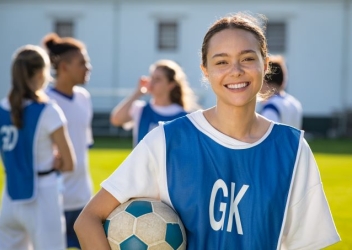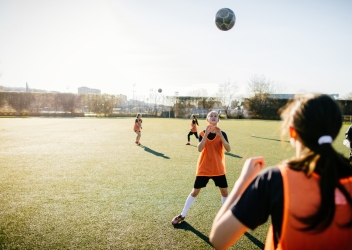Research In Action
Research In Action
Breadcrumb

Throughout the Children’s Hospital of Philadelphia network, approximately 4,000 to 5,000 youth receive care each year due to a concussion. The Minds Matter Concussion Program relies on a multidisciplinary team of researchers, physicians, psychologists, athletic trainers, nurses, and more to guide patients from an initial diagnosis to treatment. As a licensed social worker within the Minds Matter program, I work closely with our young patients and their caregivers to support them as they navigate their way through a concussion diagnosis. Here is some insight, along with three tips for caregivers, school staff, and anyone living with or providing support to someone coping with concussion.
Beyond the Initial Diagnosis
As a social worker, I help patients overcome barriers to concussion recovery beyond the exam room, providing connections to resources such as mental health treatment and specialty care as part of a patient’s treatment plan. Young people also face challenges when returning to the academic and social environment of school, so I speak with and support school staff as they accommodate a student’s treatment plan and continued recovery.
Tip: Identify barriers to recovery and take action. Mental health support, physical therapy, and education and resources for school staff are just a few of the actions we can take to ensure the best outcome for anyone recovering from concussion.
Unique Challenges
Concussion symptoms can make a patient feel lousy. A young person may experience physical impacts (headaches, nausea, and sensitivity to light and sound), negative impacts to their vision and balance, difficulties with sleep and cognitive abilities, and unwanted changes to their mood. These challenges are unique to each patient. Even the ways in which children sustain their injury, ranging from organized sports to being involved in a car accident, can lead to differences in treatment and recovery.
Tip: Embrace the complexities of concussion. A concussion diagnosis can take a patient out of their normal patterns and can make the most routine activities difficult. Even if you have previous knowledge of concussion, remember that there’s no one-size-fits-all remedy. Our team works closely with patients and their support systems to identify a treatment plan that aligns with a patient’s goals, to respond to any symptom changes, and to connect patients with additional specialty care when needed.
The Magnifying Glass
When speaking with a young person and their caregiver it’s important to remember that concussion can serve as somewhat of a magnifying glass. If a young person was previously living with a non-concussion related diagnosis (mental or physical) or was facing another challenge, the concussion diagnosis may exacerbate the problem. It can also be a stressful time for the support system around a young person diagnosed with concussion. Caregivers, friends, and school personnel may start to feel helpless when trying to support a young person with their concussion symptoms.
Tip: Keep it positive, as much as you can. I remind patients that with time and a treatment plan, there is hope that symptoms will get better and that they can get back to the routine that they are used to following.

Laura Keyes, LSW, CBIS joined the Minds Matter Concussion Program in October 2023. She has over 15 years of experience as a social worker providing school-based therapy, home and community-based services, long-term support, and more. She is a certified brain injury specialist who works closely with patients seen through the Minds Matter Concussion Program.



